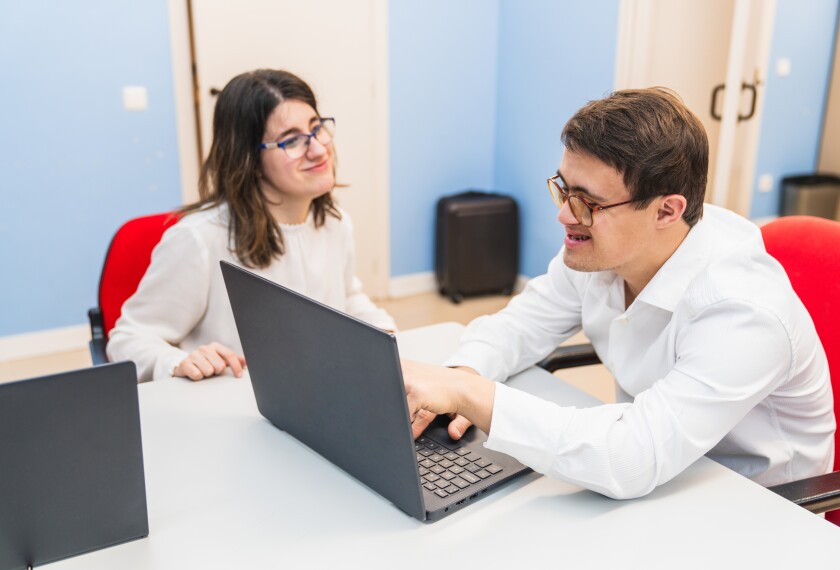The research on how students with dyslexia and other language-based learning differences learn to read is well-documented. Evidence-based approaches, such as structured literacy, are increasingly making their way into a growing number of schools—especially those designed expressly to serve dyslexic students. But they’re not the only way that these specially designed schools are preparing students for future success.
Intentionally built into the day at many of these private and public schools for dyslexic students are opportunities to grow “soft skills” like self-awareness, competence, and confidence. At first glance, such opportunities may seem to have nothing to do with literacy per se. But they but are often integrated into the school day with as much intent as the most systematic and intensive reading instruction, and some school leaders argue that they are critical students’ long-term success.
“People think it’s all about instruction,” said Timothy Castanza, co-founder and executive director of The Bridge Preparatory Charter School in the Staten Island borough of New York city. “Kids who come here have had a really bad experience in school. They’ve experienced sadness, anger, frustration … We spend a lot of time on culture, and on building a culture of acceptance, and elevating students’ voices.”
Castanza and other leaders of schools for students with dyslexia and literacy challenges share some of these strategies—unique, sometimes fun, and always deliberate—that promote self-awareness, build confidence, and support literacy competence.
Building self-awareness, self-esteem
“Students’ self-awareness and self-esteem are every bit as important as literacy,” said Martha H. Sweeney, head of The Odyssey School, a private school in a Baltimore, Md., suburb for students with dyslexia and other language-learning differences.

Many of these students, prior to enrolling at such specialized schools, developed little to no self-esteem because they struggled academically. Now, they participate in activities designed to build students’ awareness of their natural capabilities and passions—and in turn, boost their self-esteem.
Students at Odyssey join special-interest clubs that take place before the academic day begins. This means they find themselves hiking through their sprawling wooded campus, knitting, building robots with classmates, or exploring any number of other interests.
Pursuing individual passions takes an even more focused turn in 7th grade, when each student participates in “genius hour,” where for the entirety of the academic year they pursue a chosen area of study, create a project related to that passion, and eventually showcase what they’ve learned in an event open to faculty, families, and classmates.
“We’ve had students learn how to make sushi, make a dunking booth, or learn a new approach to [constructing] a ballet shoe,” said Sweeney.
At the Pittsburgh-based Provident Charter School, which serves 330 students with dyslexia and other language-based disorders in 2nd through 8th grades, every student takes taekwondo, a form of martial arts, as a “special”—just like art, music, or physical education.
“The school founder wrote taekwondo into the charter [as part of the curriculum]. He is dyslexic, as are his two children, and he recognized the benefits,” said Maria Paluselli, the school’s chief executive officer, who explained that the practice instills self-control, discipline, and a sense of accomplishment in participants.
It also shares unique similarities to literacy, explained Paluselli, in that it teaches patterns and sequences.
Creating awareness of positive traits and possibilities
“We talk a lot about the ‘dyslexic advantage’,” said Rebecca Thompson, director of academic services at ALLIES Elementary (which stands for Academy for Literacy, Learning, and Innovation Excellence), a public school in Colorado Springs, Colo., serving students with dyslexia in grades 2 to 5.
There are plenty such advantages, some of which include a strong propensity toward spatial reasoning, critical thinking, problem-solving, and empathizing, according to educational researchers at the University of Michigan.
Introducing students to adults with dyslexia who have harnessed such strengths and subsequently achieved great success can inspire children who have experienced intense feelings of defeat when unable to learn to read alongside their general education classmates.
At Bridge Preparatory, classrooms are named after famous people with dyslexia so that students are constantly reminded of what’s possible. Odyssey routinely brings to campus dyslexic guests, some of whom have achieved fame, to talk with students about their personal and professional journeys. This year, they welcomed Mark Stoddart, an internationally reputed sculptor from Scotland who has severe dyslexia. Students also recently enjoyed a virtual visit from Bryan Perla, the 23-year-old founder and CEO of Little ELF Products, Inc., an e-commerce and retail gift wrap solutions company, and a graduate of Stanford with an engineering degree. He, too, has dyslexia.
Sweeney noted that the school also makes an effort to bring alumni back to school to talk with students. “It’s really valuable to our students to see previous students who have taken what they learned from Odyssey and moved forward,” she said.
The school also works hard to ensure that students are ready to move on at the end of 8th grade. Most graduates attend mainstream high schools.
“When they come here, they wonder why they’re more challenged by reading than their peers,” Sweeney said. “We help them understand that they think a little differently, but that they are perfect just the way they are. Every child here hears that many times over. When they develop competence [in reading], they know it.”






